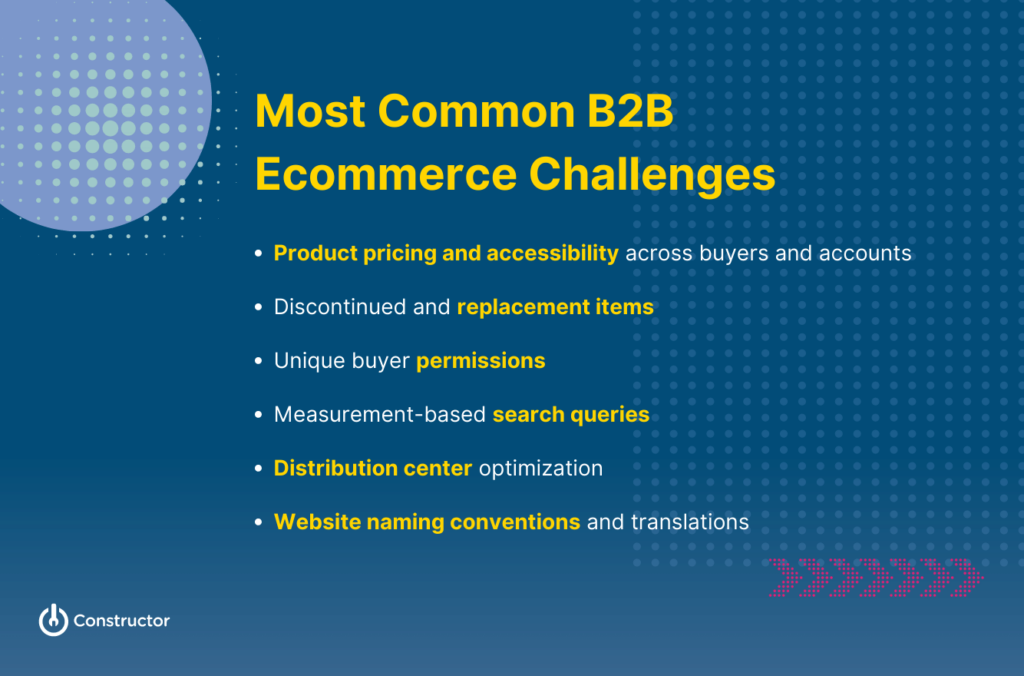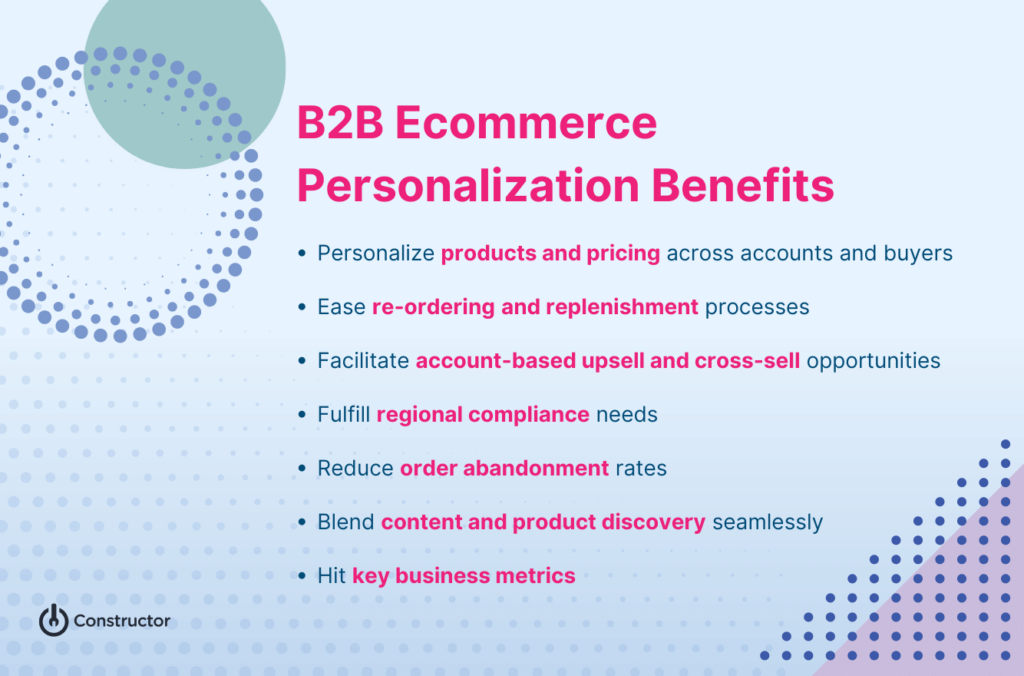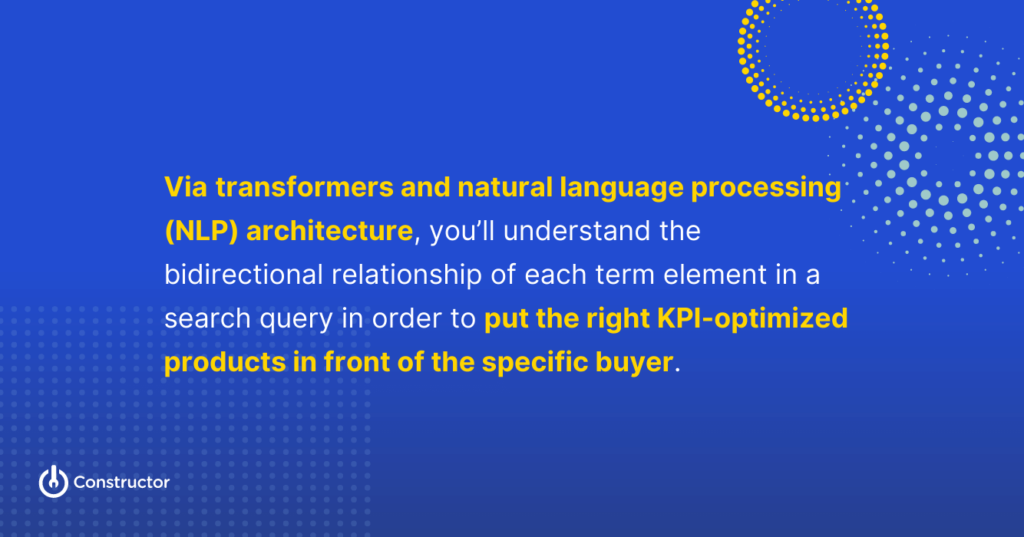Given the role that ecommerce websites play in the B2B sales process, it’s critical for companies to embrace new tools, channels, and ways of selling to engage purchasers and facilitate their buying practices. After all, almost a third of B2B buyers research independently online before making a decision.
Luckily, personalization can help.
It’s the missing puzzle piece to ensure your site experience is tailored to the ordering habits of your buyers, regardless of their needs and the complexity of your catalog.
Let’s discuss how B2B ecommerce personalization can help you hit important business KPIs and provide your buyers with unrivaled purchasing experiences
Brief Overview of B2B Ecommerce
Personalization in B2B ecommerce is fundamentally different from B2C. For starters, it’s no longer only about the specific individual, yet also the role they are in the organization, the organization or business unit itself, and the products they have access to.
The various B2B buyer personas and their needs include but aren’t limited to:
- Inside sales reps or CSRs (Customer Service Reps) who take orders from clients over the phone and need to quickly and easily enter them into the system on the clients’ behalf.
- Field sales reps who need great product content and visuals to use as sales and educational material when building out real-time purchase orders (POs) and quotes in the field for clients.
- Technical / product leads who are activating and deactivating new products, managing assortments, and managing the product catalog in its entirety.
- Procurement or vendor managers who manage the supply side of the experience and need to be able to implement product, pricing, shipping, and process changes for the suppliers they manage.
- Buyers who need to find new products easily, replenish previously purchased items, find discontinued alternatives, and research project budgets leveraging a frictionless search tool.
The Most Common B2B Ecommerce Challenges

Because B2B ecommerce deals with countless products, accounts, and buyers, personalizing the purchasing experience doesn’t come without its unique challenges:
- Product pricing and accessibility for buyers within each account. It can be difficult to decide at what level personalization in B2B ecommerce belongs — individual vs. persona vs. business unit vs. account level. There are many variations of products, restrictions, and/or conditions for each account. Accessibility also can become a problem, where there are multiple people on a single device and/or multiple people in a single account.
- Discontinued and replacement items. It’s typical for B2B buyers to perform repeat purchases of the same product for years on end, often performing searches by SKU. Issues can arise when products are no longer available, especially if the product discovery platform isn’t programmed to forward buyers to a replacement, like a new product version or batch.
- Unique buyer permissions. It’s tricky to handle personalization when there are buyer vs. orderer permissions. For example, User A can build out the order (“add to order”). But only User B — the manager — can complete or modify the order (“complete order”). This also creates clickstream attribution difficulties.
- Measurement-based search queries. B2B ecommerce users generally search for products by alpha-numerical values like SKUs, product identification number, etc. They also search with units of measurement that can introduce complexity (i.e., 2 ¾” galvanized lag bolt, #10-32 zinc nylon lock nut, 1/2 in.-13 x 8 in. stainless steel carriage bolt, 180-64 fl. oz.). To complicate things further, SKU-only search is often on a separate “Quick Order” or “Bulk Order” section of the site.
- Distribution center optimization. Challenges often arise in B2B ecommerce when it comes to inventory management, specifically inventory bloat. Without the right product discovery platform, you won’t be able to increase visibility for specific products based on user location, which can reduce excess inventory without needing major markdowns.
- Website naming conventions and translations. Lastly, a cart isn’t always called a cart in B2B ecommerce. It could also be called the purchase order (PO), order form, or simply, the order.
Benefits of Personalization in B2B Ecommerce

B2B ecommerce sites are more than just sales tools during the ordering process. When built with AI-powered, interconnected product discovery platforms, they allow you to provide a uniquely personalized on-site experience, drive key business metrics, and overcome common challenges.
We break down advantages of B2B ecommerce personalization below:
Personalize Products and Pricing Across Accounts and Buyers
Whether via search, browse, or elsewhere, customize how buyers across accounts interact with your products and the prices they see. The right personalization software makes this possible, thanks to hidden facets and metadata.
You’ll also have the ability to govern contracts to support product assortment and account-based pricing — via a catalog open schema structure — and define role-based permissions for proper account attribution (i.e., order builder vs. order submitter).
Ease Re-Ordering and Replenishment Processes
Leverage clickstream data to allow your clients to stock up quicker and easier.
When blended with AI, this conversion-focused data forms the foundation for a buyer-centric re-purchasing process. For example, strategically placed recommendations that align well with the buyer’s journey can quicken the ordering process for re-orders and discontinued alternatives.
With the right product discovery solution, you can also more accurately define replenishment frequency and reveal the full client purchase history via ingesting offline purchase data.
Facilitate Account-Based Upsell and Cross-Sell Opportunities
Bundling products in B2B is also key to avoid restricted market share issues, where some businesses are inadvertently locked into product categories according to what clients believe they offer.
For example, some B2B brands could get bucketed as the “oil filter” supplier when they also carry oil, gaskets, and much more.
Reduce Friction in the Buying Cycle
Overall, B2B ecommerce personalization improves product findability.
As touched on before, it passively collects clickstream data — browser behavior, previous purchase history, and other metrics — to customize account-based recommendations, search, autosuggest, category pages, product finders, and more.
This eases friction in the buying process as best-fit products are returned more quickly.
Increase Client Loyalty
It can cost four to five times more to acquire new clients versus retaining existing ones. If you serve your current clients with an unforgettable experience, you’ll increase brand loyalty, client lifetime value (CLV), and subsequently, revenue.
Fulfill Regional Compliance Needs
Certain metals, chemicals, etc. have mandatory regional or state regulations. For instance, a B2B client could have buyers in Atlanta and California, but they can’t purchase the same items because of state regulations.
A B2B supplier can solve this problem with an AI-powered product discovery tool, which can support geographical restrictions with little to no manual intervention.
Reduce Order Abandonment Rates
Likewise, B2B ecommerce personalization strategies performed right can also re-engage and recover lost sales from order abandonments by providing relevant alternatives based on purchase history.
Blend Content and Product Discovery Seamlessly
Whether it is specification documents or how-to guides, B2B clients want to be empowered in the research, purchase, and post-purchase phases. Content and product need to be intertwined throughout the journey with higher importance at different stages.
This is made possible by a product discovery solution that uses AI and machine learning (ML) to surface products and content based on individual client data and behaviors.
Hit Key Business Metrics
Need to increase visibility of proprietary brands? Optimize for inventory management? Conversions? 1:1 personalization with AI allows you to return the right products to the right decision maker at the right time while setting the AI to that KPI objective.
Through the use of transformers and natural language processing (NLP) architecture, you’ll understand the bidirectional relationship of each term element in a search query in order to put the right KPI-optimized products in front of the specific buyer.

Get Started with B2B Ecommerce Personalization
With the right strategy, B2B ecommerce can be tailored to benefit both businesses and buyers.
By leveraging account- and role-based information to personalize search results, B2B ecommerce companies can improve the buying experience for self-service buyers, increase CLV, and enhance brand loyalty.
But by taking things one step further, B2B ecommerce companies can employ advanced ML models that automatically learn from every buyer action and instantly optimize for business KPIs on top of search results and any other product display. This ultimately drives revenue and exceptional business outcomes.
We call it personalized product search and discovery built for your bottom line.

